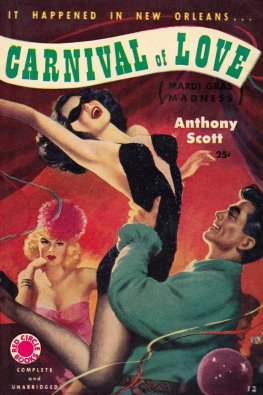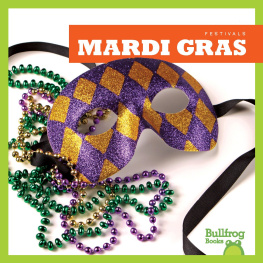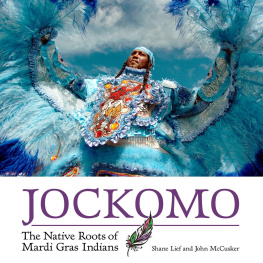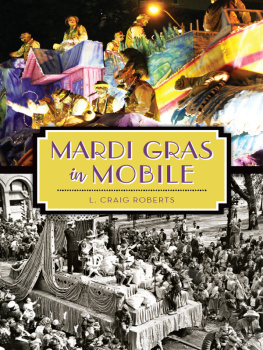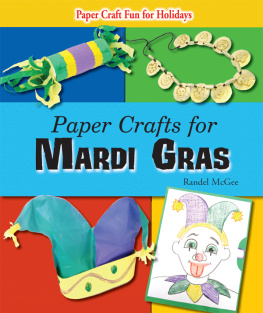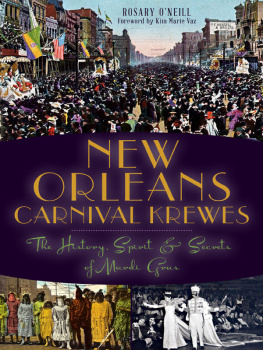DOWNTOWN MARDI GRAS
DOWNTOWN
Mardi Gras
NEW CARNIVAL PRACTICES IN POST-KATRINA NEW ORLEANS
Leslie A. Wade, Robin Roberts, and Frank de Caro
UNIVERSITY PRESS OF MISSISSIPPI / JACKSON
Publication of this book has been generously supported by the Fulbright College of Arts and Sciences and the Department of Theatre and Department of English at the University of Arkansas.
The University Press of Mississippi is the scholarly publishing agency of the Mississippi Institutions of Higher Learning: Alcorn State University, Delta State University, Jackson State University, Mississippi State University, Mississippi University for Women, Mississippi Valley State University, University of Mississippi, and University of Southern Mississippi.
www.upress.state.ms.us
Designed by Peter D. Halverson
The University Press of Mississippi is a member of
the Association of University Presses.
Copyright 2019 by Leslie A. Wade, Robin Roberts, and Frank de Caro
All rights reserved
Manufactured in the United States of America
First printing 2019
Library of Congress Cataloging-in-Publication Data
Names: Wade, Leslie A., author. | Roberts, Robin, 1957 author. | De Caro, F. A., 1943 author.
Title: Downtown Mardi Gras : new carnival practices in post-Katrina New Orleans / Leslie A. Wade, Robin Roberts, and Frank de Caro.
Description: Jackson : University Press of Mississippi, [2019] | Includes bibliographical references and index. |
Identifiers: LCCN 2018058795 (print) | LCCN 2018061545 (ebook) | ISBN 9781496823793 (epub single) | ISBN 9781496823809 (epub institutional) | ISBN 9781496823816 (pdf single) | ISBN 9781496823823 (pdf institutional) | ISBN 9781496823786 (hardcover : alk. paper) | ISBN 9781496823847 (pbk. : alk. paper)
Subjects: LCSH: CarnivalLouisianaNew OrleansHistory. | Hurricane Katrina, 2005Social aspectsLouisianaNew Orleans. | Community lifeLouisianaNew OrleansHistory21st century. | New Orleans (La.)Social life and customs21st century.
Classification: LCC GT4211.N4 (ebook) | LCC GT4211.N4 W34 2019 (print) | DDC 976.3/35dc23
LC record available at https://lccn.loc.gov/2018058795
British Library Cataloging-in-Publication Data available
To our grandchildren, Amelia, Evangeline, and Isaac Pierce, and Grace and Josephine Collins, in the fervent hope that Downtown Mardi Gras will continue and provide them with joy.
Leslie A. Wade and Robin Roberts
CONTENTS
CHAPTER 4: The Red Beans Krewe:
An Iconic Dish and a New Parade
CHAPTER 6: Reclaiming Life and History:
The Amazons Benevolent Society and the Black Storyville Baby Dolls
ACKNOWLEDGMENTS
We gratefully acknowledge the assistance of Michael Riha, Chair of the Department of Theatre, Dorothy Stephens, Chair of the Department of English, Todd Shields, Dean of the Fulbright College of Arts and Sciences (University of Arkansas), for their support that enabled the photographs in this book to appear in color. Some pages from . Will Rigby improved the book through careful copyediting, Valerie Jones, editor, provided efficient and professional management of the manuscript, and Kristin Kirkpatrick created our index. The two anonymous readers of the manuscript offered encouragement and helpful feedback. We want to acknowledge Rosan Augusta Jordan, Joseph Ross, Geoff Clayton, Michael Reese, Laurie Kelly, and Bernard Lavoie, who have been a part of our Mardi Gras experiences over the years. And of course, our greatest debt is to the many interview subjects who graciously offered their time and insights to the completion of this book. We are so grateful for their expansion of Mardi Gras practices, which we have enjoyed as participants and as audience members.
DOWNTOWN MARDI GRAS
INTRODUCTION
Downtown Mardi Gras
Leslie A. Wade
Mardi Gras 2006 / 2017
Following the devastation of Hurricane Katrina, a destruction in scale never experienced by an American city, New Orleans faced innumerable challenges heading into the year 2006: how to rebuild homes, businesses, and infrastructure; how to facilitate the return of thousands of residents scattered across the country; how to address the stark racial and economic divides the storm exposed to a global media audience; how to bring to the city a daily working order with open schools, basic mail delivery, and operating public transit? Amidst such an array of truly daunting issues, the citizens of New Orleans faced another difficult, highly emotional, and often polarizing concern: Should Mardi Gras go on? Should the city go forward with the signature event that for decades had signified New Orleans and its distinctive culture to people around the world?
Heading into 2006, the city still was missing nearly half of its population (Plyer Facts for Features). Damaged or destroyed properties dominated many swathes of the city. Police and fire departments struggled with depleted ranks. Many argued against the celebration of Carnival in the initial aftermath of the Katrina disaster, citing the inadequacies of public services, the continuing diaspora of citizens, the expenditures (both public and private) demanded by the event in the face of so much need. Chief among concerns was the appropriateness of festivity, of Carnival revelry so soon after the city had undergone such trauma. For many the idea of celebration seemed unthinkable given the physical and emotional losses of the populace who had witnessed the rising waters engulf their homes and bring the city to its knees.
Whether Mardi Gras 2006 would occur or not proved a matter of considerable public and private debate. Mayor Ray Nagin initially sided with cancellation but decided on going through with the event. Discussion within the Zulu Social Aid and Pleasure Club was vigorous, often heated. A former Zulu king threatened legal action to halt the groups participation, though its current officers argued passionately for proceeding, for honoring the parades traditional neighborhoods, for being on the streets at full strength (Laborde 102). Proponents of going on with the holiday did not seek to minimize the suffering brought by Katrina and the failure of the levees; rather, they argued that honoring Carnival would prove a tribute to the people of New Orleans, affirming the life of the city in face of demoralizing and often degrading experiences. Local writer Chris Rose, whose Times-Picayune columns provided inspiration and comfort during this time, wrote in unambiguous terms: We need to send a message, that we are still New Orleans. We are the soul of America. We embody the triumph of the human spirit. Hell. We ARE Mardi Gras (1 Dead in Attic 144). In this light, Mardi Gras offered the opportunity to demonstrate survival, to uphold the citys unique way of life, and to collectively embody an unbroken spirit, one tested by epochal suffering and loss.
The city brought a stirring commitment and a profound sense of pride to this first post-Katrina Carnival. The season of 2006 was a diminished one, though Carnival did go on. Krewe du Vieux, the satirical walking group known for its pointed and often salacious humor, helped kick off Carnival with its trek through the Marigny and French Quarter, sporting costumes and floats utilizing blue tarp as a prominent material, exhibiting signs and placards that excoriated FEMA and federal inattentionsuggesting a return to France: Buy Us Back, Chirac! The krewe (the local term for a Carnival organization) was embraced with fervor and elicited strong response from the crowds, a communal expression born in part by frustration, in part by defiance.




